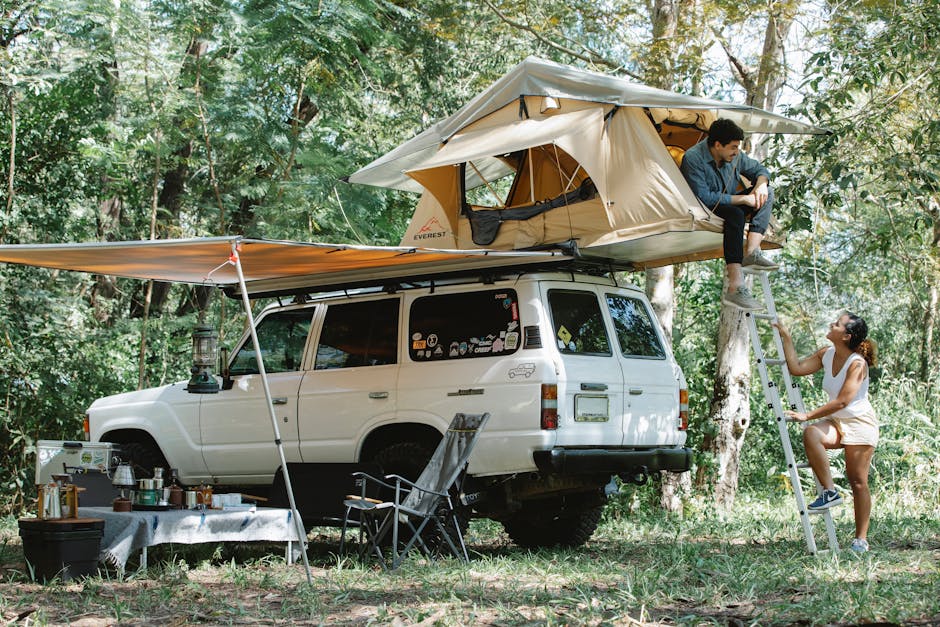Best SUV Camper Conversion: Top 5 Ultimate Guide 2025
Why SUV Camper Conversions Are Taking Off
The best suv camper conversion offers a way to experience outdoor trips without the massive investment of a full van build. With its market growing, more travelers are realizing you don’t need a huge van for the nomadic dream.
Top SUV Camper Conversion Options:
- Toyota 4Runner – Best for off-road reliability and community support
- Subaru Outback/Forester – Best for fuel efficiency and all-weather capability
- Honda CR-V/Element – Best for reliability and practical interiors
- Jeep Wrangler – Best for extreme off-road capability
- Ford Explorer – Best value for spacious family-friendly conversions
SUVs have compelling advantages over vans: they’re cheaper to buy and convert, offer better gas mileage, and still function as a daily driver. Most conversions cost between $5,000 and $15,000, a fraction of a van build.
The beauty of SUV conversions is their versatility. A simple DIY platform can cost a few hundred dollars, while modular kits can transform your vehicle in minutes. Either way, you get a stealth camper that can access remote locations larger RVs can’t.
As one overlander put it: “Few vehicles offer the range of creativity and flexibility as the humble SUV for camper conversions.” Whether you’re planning weekend getaways or considering full-time nomadic living, an SUV conversion delivers the freedom to explore without breaking the bank.
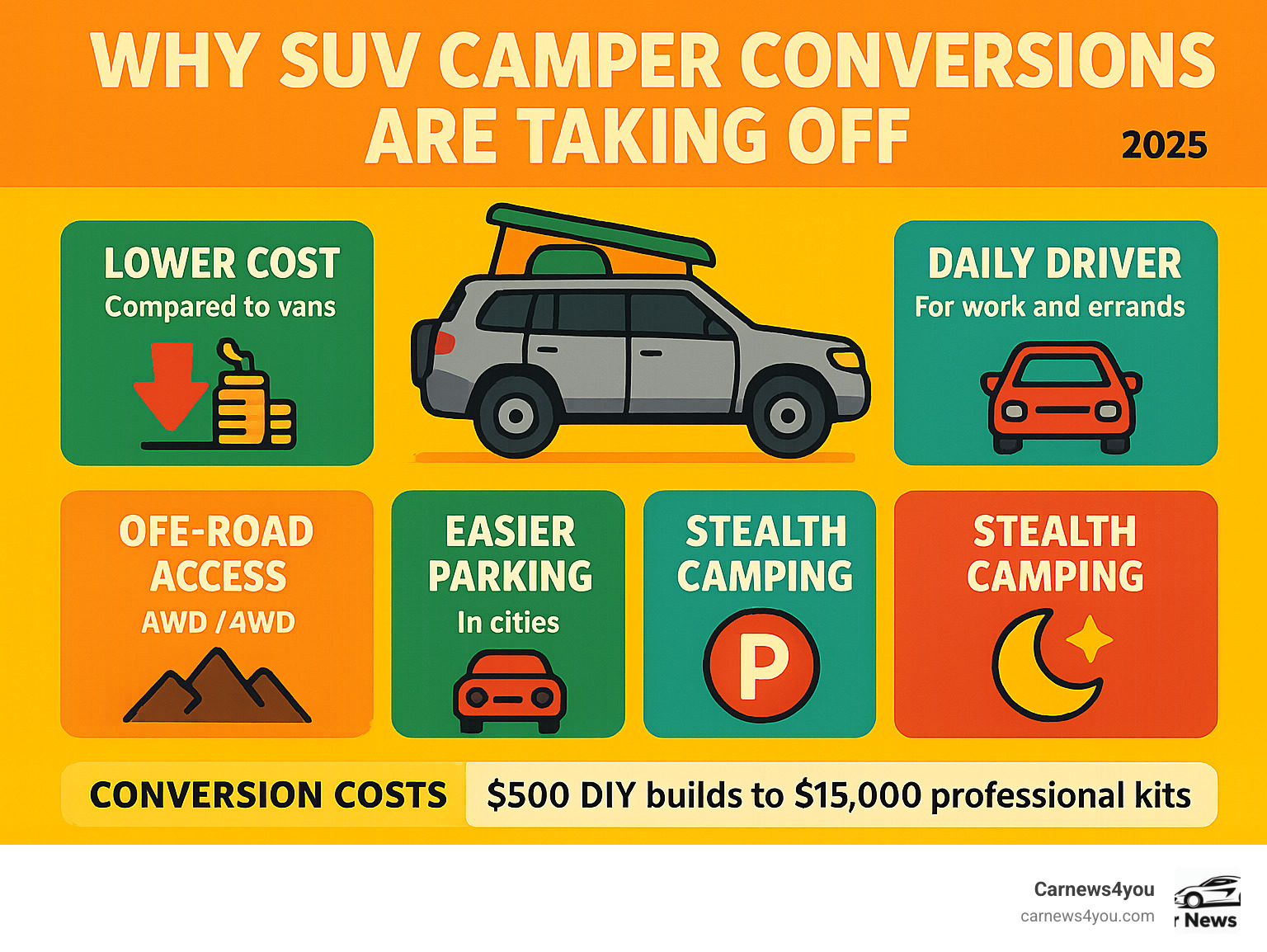
Why an SUV is a Great Choice for Your Next Camper
While many dream of a massive van, your everyday SUV might be the smarter choice for camping trips.
The biggest win is cost-effectiveness. Van conversions can cost $30,000 to $100,000+, while most best suv camper conversion projects fall between $5,000 and $15,000. This offers a much lower entry point, especially if you already own an SUV.
SUVs also have a fuel economy advantage. Popular models deliver 16-20 combined MPG (up to 23 highway), compared to 15-20 MPG for larger vans. Those savings add up on long trips.
A key benefit is daily driver usability. Unlike a dedicated camper van, your converted SUV serves as your regular car for work and errands during the week. Many conversion kits are easily removable, offering the best of both worlds.
SUVs excel in off-road capability. With higher ground clearance and available 4WD or AWD, you can reach remote campsites that are inaccessible to most vans.
The stealth camping potential is a huge plus. An SUV blends in on city streets or in residential areas, avoiding the unwanted attention an obvious camper van might attract.
Better maneuverability and parking make city driving a breeze, as you can fit into regular parking spots and steer tight streets easily.
| Feature | SUV Camper | Van Camper |
|---|---|---|
| Initial Cost | Lower entry point, especially for used vehicles. Many conversions $5,000-$15,000. | Higher initial vehicle cost. Full builds $30,000-$100,000+. |
| Fuel MPG | Generally better (e.g., 16-20 combined MPG for popular models). | Typically lower (e.g., 15-20 combined MPG for larger vans). |
| Stealth | High. Blends in with regular traffic, less conspicuous for urban camping. | Lower. Often easily identifiable as a camper, less discreet. |
| Interior Space | Limited, requires creative solutions for sleeping, cooking, storage. Low headroom. | Ample, often allows standing room, more space for amenities. |
| Off-road ability | High, especially with 4WD/AWD. Better ground clearance and maneuverability on rough terrain. | Varies. Some 4×4 options, but generally larger and less agile off-road. |
| Build Complexity | Can be simpler due to smaller space; many bolt-in kits available. DIY can be quick. | More complex, requires more carpentry, electrical, plumbing. Can be very time-consuming. |
While you trade some interior space, the benefits often outweigh the compromises, making an SUV conversion the perfect gateway to mobile camping.
Getting Started: DIY Build vs. Pre-Made Kits
Once you’ve decided on an SUV, the next step is the conversion. You have two main paths: a hands-on DIY build or a convenient pre-made kit. Each has pros and cons regarding cost, time, customization, and reversibility.
The DIY Approach
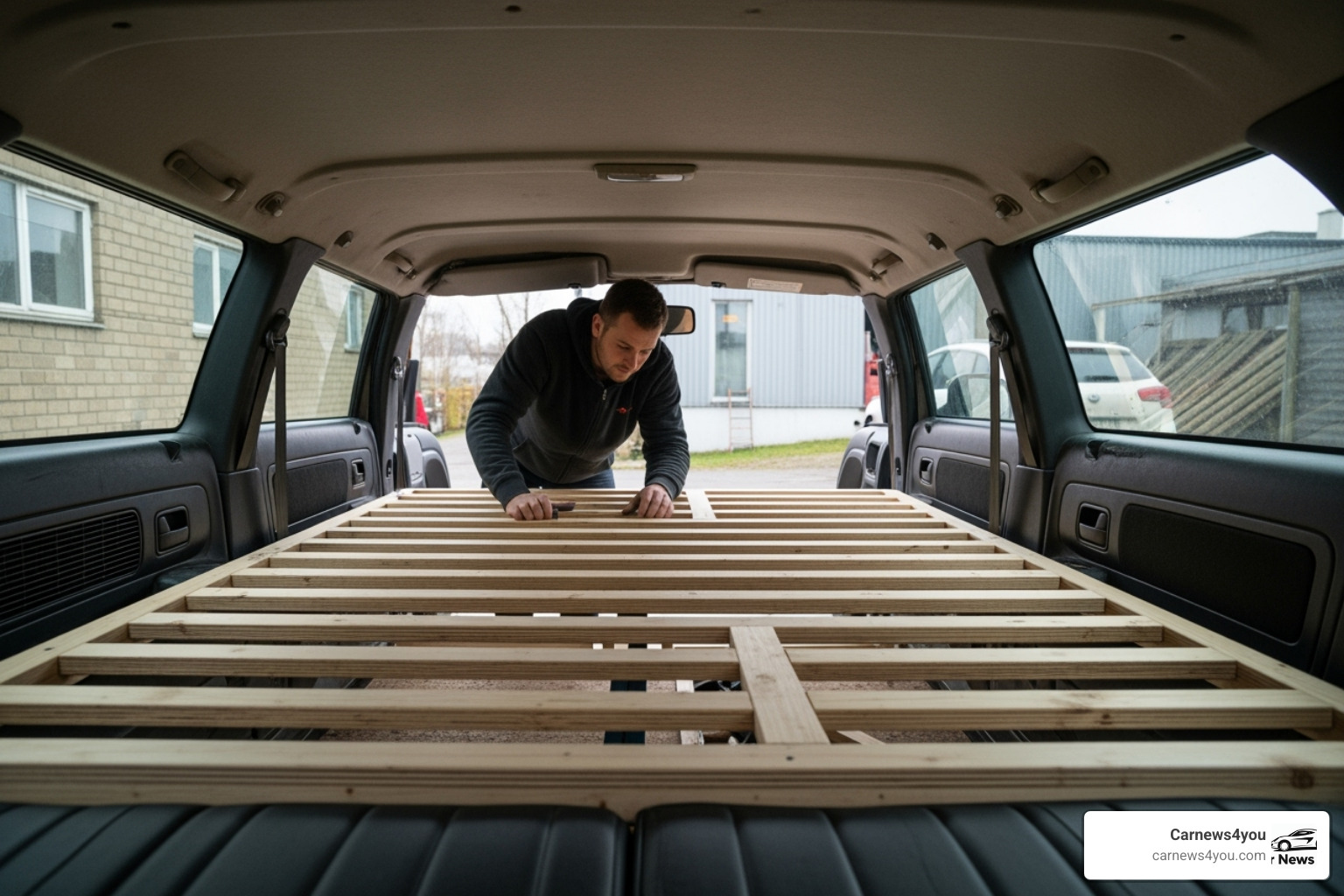
The DIY route is the cheapest way to create your best suv camper conversion, with basic builds costing just a few hundred dollars. Most start with a plywood platform for sleeping, which also creates storage space underneath. The biggest pro is total creative control; you design the space to perfectly fit your needs, materials, and layout. The satisfaction of building it yourself is a huge bonus. For more guidance, check out our resource: More info about car camping.
However, DIY requires skills and tools for carpentry and problem-solving. It’s also a significant time commitment, from a few days for a simple platform to weeks for complex builds. This can be overwhelming without the right experience or time.
Pre-Made Conversion Kits
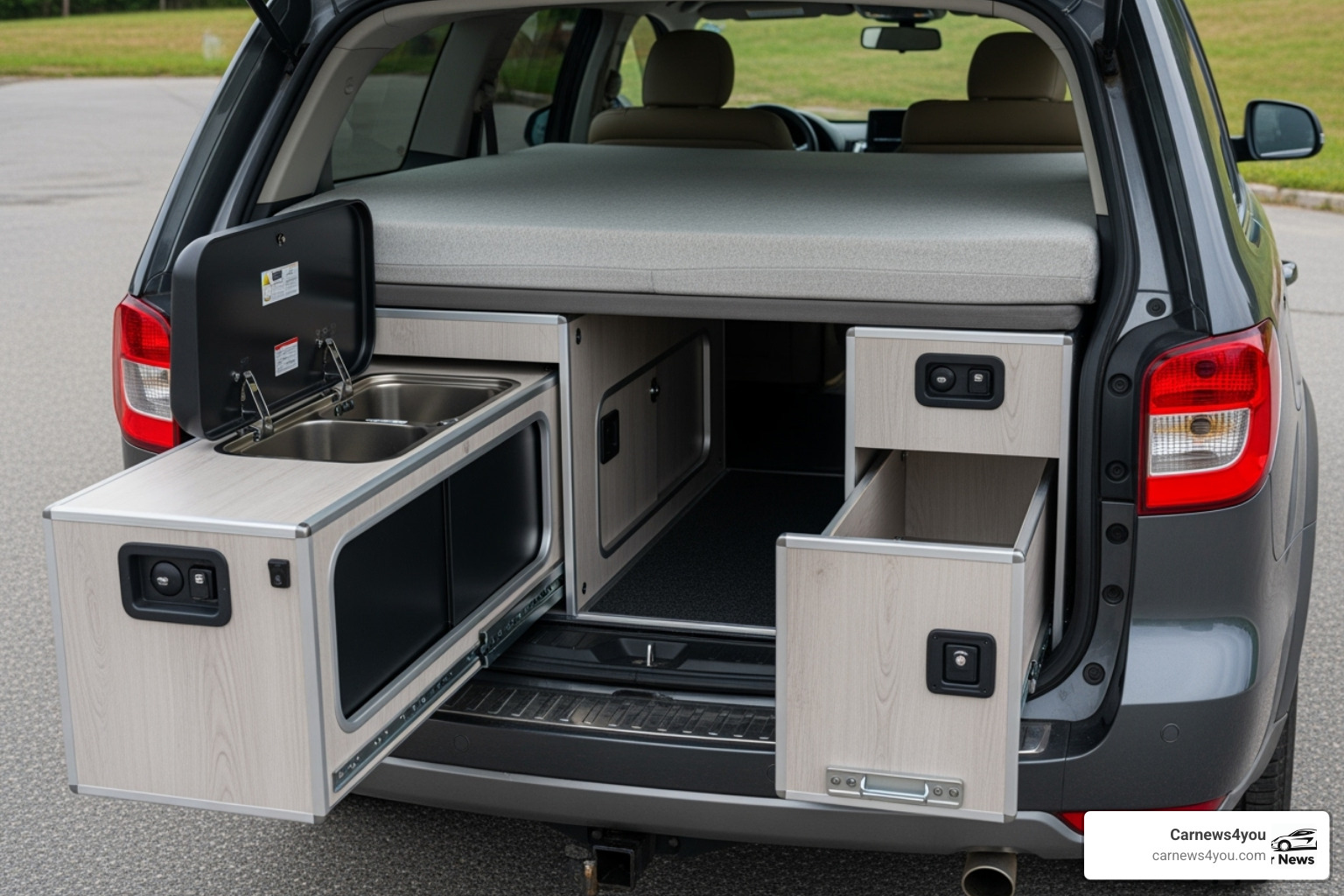
For those short on time or tools, pre-made conversion kits offer a plug-and-play solution for your best suv camper conversion. These modular systems are often designed for specific models and boast tool-free setup, changing your vehicle in minutes. Typical components include a sleeping platform, slide-out kitchens, and storage drawers. Brands like Vanpackers, Egoé Nest, and Compass Campers offer everything from simple platforms to full kitchenette units.
The main advantages are convenience, speed, and reversibility, as you can easily remove the kit. The downside is a higher initial cost, with kits ranging from $1,000 to over $5,000, and less customization. For many, the professional finish and time saved are worth the investment.
Top 5 SUV Models for a Camper Conversion
Choosing the right SUV is the foundation of your best suv camper conversion. The best candidates share key traits: rock-solid reliability, generous interior space and cargo capacity, a capable drivetrain (AWD/4×4), and strong aftermarket support for parts and advice. Here are five SUVs that consistently top the list for conversion enthusiasts:
Toyota 4Runner

The 4Runner has legendary status for its off-road prowess and durability. Its large cargo area (up to 73 inches with seats folded) and relatively flat load floor make it a great canvas for a sleeping platform. The massive community support is another huge advantage, with countless owners sharing builds and tips. This build by @drew.simms shows a great example of what’s possible.
Subaru Outback / Forester
Known for their versatility, the Outback and Forester feature impressive Symmetrical All-Wheel Drive for all-weather capability. Their excellent fuel efficiency (26-33 highway MPG) is ideal for road trips. While not as large as other SUVs, they offer ample headroom and flat-folding seats that create a convenient sleeping area. For more on these models, see our Best Camping SUV guide.
Honda CR-V / Element
Honda’s reputation for reliability makes the CR-V and Element great choices. The CR-V offers a balance of size, efficiency, and a spacious, practical interior. The discontinued Element is a cult classic for conversions due to its boxy shape and incredibly flat floors, creating a dream canvas for builders. Both models offer excellent fuel efficiency. This video shows a simple CR-V build that highlights their potential.
Jeep Wrangler / Grand Cherokee
For serious trails, Jeeps offer best off-road capability. The Wrangler’s removable tops and doors allow for a unique open-air camping experience. A strong aftermarket provides endless customization options for tires, storage, and recovery gear. Their iconic design is backed by serious performance. For more adventurous vehicles, see our Best Trip Vehicles 2024 guide.
Ford Explorer / Escape
Ford’s Explorer and Escape are practical choices, offering spacious interiors and great value on the used market. This makes them accessible entry points for a best suv camper conversion. The Explorer’s available third-row, when removed, creates a huge cargo area perfect for ambitious builds. While they prioritize a comfortable ride over extreme off-roading, they handle standard campsite access with ease. Learn more in our Best SUV for Travel guide.
The Ultimate Guide to the Best SUV Camper Conversion Layouts & Features
With your SUV chosen, it’s time to plan the layout. A successful best suv camper conversion hinges on maximizing comfort and functionality in a small space and keeping essential gear accessible.
Maximizing Space: Smart Storage and Layouts
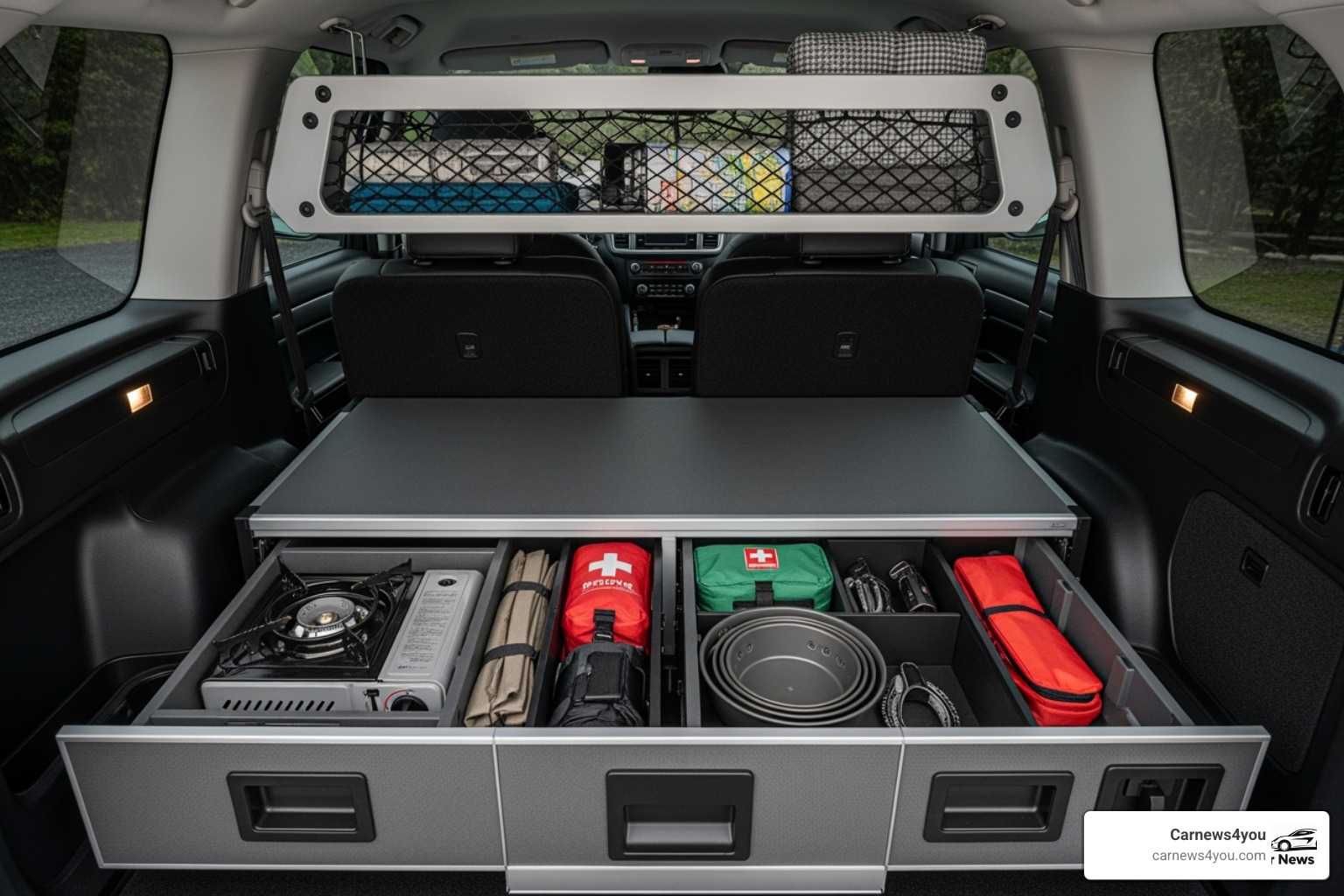
The core of most conversions is a bed platform with under-bed storage, which creates a large space for gear, often with hinged sections for easy access. Rooftop cargo boxes are essential for bulky items, keeping the interior uncluttered. Inside, simple solutions like bungee nets on the ceiling and seat-back organizers are great for small items. Also consider vertical storage solutions like hanging mesh pockets to maximize every inch of space.
Essential Features for Your Best SUV Camper Conversion
A great best suv camper conversion requires planning four key areas: sleeping, cooking, power, and comfort.
- Sleeping Setup: A comfortable night’s sleep is crucial. Options include a custom-cut folding mattress, high-quality sleeping pads like the Exped MegaMat Duo, or an SUV-specific air mattress.
- Kitchen Setup: A basic kitchen transforms the experience. Essentials include a portable stove, a cooler or 12V fridge, and a water container. Many kits feature slide-out kitchen units.
- Power Source: To keep devices running, use a portable power station. For off-grid trips, add solar panels to charge the station or a dedicated house battery that can be wired to charge while you drive.
- Ventilation: This is vital for comfort and preventing condensation. Use window screens to allow airflow while keeping bugs out, and add small 12V fans to circulate air.
Special Considerations for Your Best SUV Camper Conversion
A few special considerations can lift your conversion.
- Stealth Camping: To camp discreetly in urban areas, make your SUV look normal from the outside. Use window covers for privacy and maintain a low-profile setup inside.
- Off-Roading: For rough terrain, equip your SUV with all-terrain tires and essential recovery gear like traction boards and a shovel.
- Legal & Registration: While less regulated than RVs, it’s wise to check local regulations regarding vehicle modifications and overnight parking.
- Common Challenges: Be prepared for condensation (combat with ventilation) and limited headroom. Plan your layout for comfortable sitting and sleeping, focusing on the SUV’s strengths like maneuverability and off-road access.
Frequently Asked Questions about SUV Camper Conversions
Here are answers to the most common questions about SUV camper conversions.
How much does an SUV camper conversion cost?
The cost varies wildly. A basic DIY approach can be just a few hundred dollars for materials like plywood and foam. Pre-made kits range from $1,000 to over $5,000, depending on features like slide-out kitchens. While full custom builds can be more, many conversions cost between $5,000 and $15,000 total—a fraction of a professional van build, making the best suv camper conversion a very reasonable option.
Can you live full-time in an SUV camper?
Yes, but it requires a minimalist lifestyle. Space is the biggest challenge, as you won’t have standing room or a full kitchen. It’s best suited for solo travelers or couples who are comfortable in close quarters. Many people do it successfully and love the freedom, like this couple in their 4Runner. The key is to spend most of your time outdoors, using the vehicle as a mobile basecamp.
How do you go to the bathroom when camping in an SUV?
This is more manageable than you’d think. Your strategy depends on your location.
- Developed Areas: Use public restrooms at gas stations, grocery stores, and visitor centers.
- Campgrounds: Take advantage of established facilities, which often include showers.
- Off-Grid: Portable camping toilets are a great solution and come in various compact designs perfect for a best suv camper conversion.
- Backcountry: Follow Leave No Trace principles by digging catholes 6-8 inches deep and at least 200 feet from water sources, trails, and campsites. Always pack out toilet paper.
Conclusion
We hope this guide has shown the incredible possibilities that lie within your everyday SUV. The best suv camper conversion is an accessible entry into vehicle travel, offering a balance of cost-effectiveness, fuel efficiency, stealth camping, and off-road prowess that larger RVs can’t match.
Whether you choose a DIY build or a pre-made kit, there’s a path for every budget and style. From the reliable Toyota 4Runner to the practical Honda CR-V, the right vehicle is out there. Success lies in smart storage, essential features like a good sleeping setup and power source, and overcoming challenges like limited headroom with creative solutions.
At Carnews4you, we believe exploration should be for everyone. The right vehicle and conversion can turn the dream of a nomadic lifestyle into a reality. Your best suv camper conversion is waiting to take you on your next trip. Start planning today and find your perfect vehicle with our help.
Find your perfect trip vehicle in our guide to the Best Cars for Camping

